| | | OFFLINE | | Post: 19.178
Post: 1.822 | Registrato il: 28/08/2005
Registrato il: 20/01/2009 | Administratore | Utente Veteran | |
|
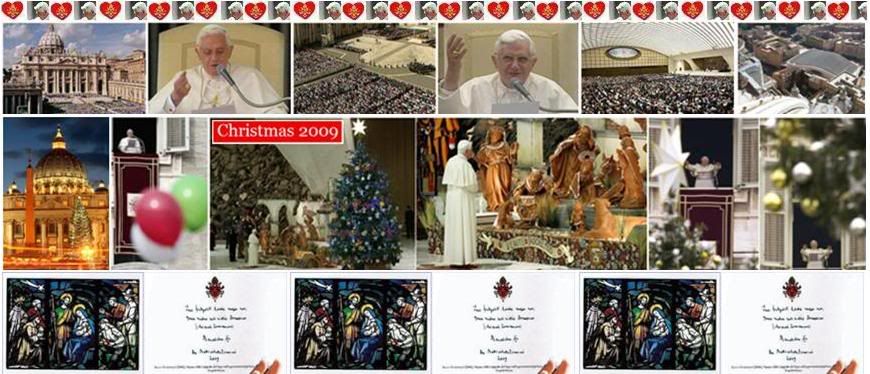
 GENERAL AUDIENCE TODAY
GENERAL AUDIENCE TODAY
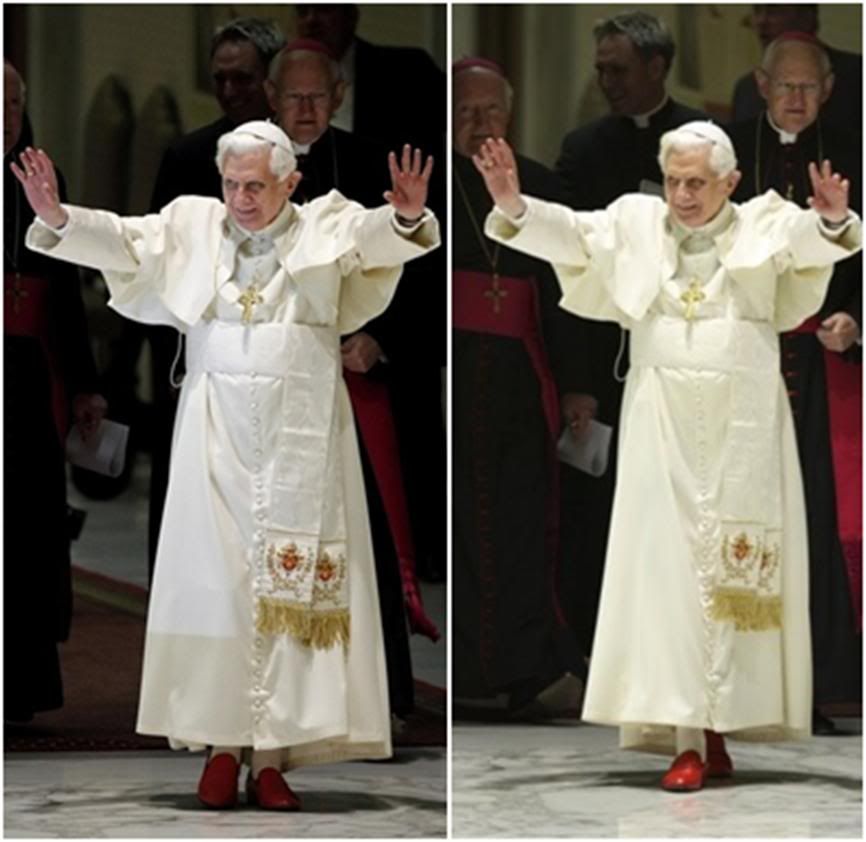
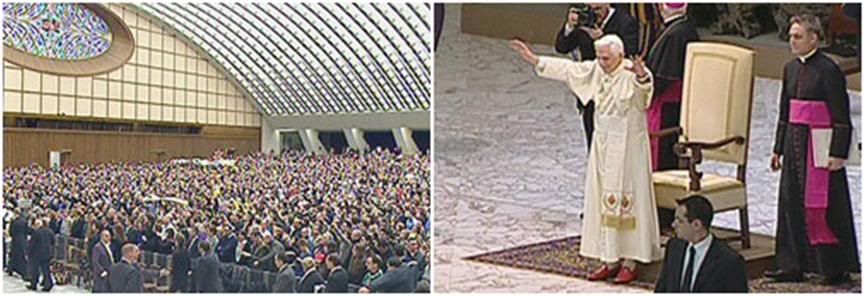
Pope Benedict XVI today gave his last General Audience for 2009 at the Aula Paolo VI and spoke about Pierre Lombard, a 12th century Italian theologian who wrote what would the standard manual for theology over the next four centuries.
Here is how the Holy Father summarized today's catechesis in English:
In our catechesis on the Christian culture of the Middle Ages, we now turn to Peter Lombard, an outstanding theologian of the twelfth century.
Peter taught at the celebrated school of Notre Dame, and died as Bishop of Paris. His best-known work, Sentences, is a collection in four books of patristic texts, carefully selected and ordered for use in the teaching of theology. The Sentences became the standard introduction to theology for centuries, influencing the thought of scholars such as Saints Albert the Great, Bonaventure and Thomas Aquinas.
The Church requires such organic presentations of the Catholic faith, in which each individual article of faith reflects the unity of God’s revealed truth and the majesty of his saving plan.
Peter Lombard’s work thus served a need which, in our day, is also met by the Catechism of the Catholic Church. Among the most enduring contributions of Sentences is Peter’s definition of a sacrament as an outward sign and cause of grace, and his teaching on the sevenfold number of the sacraments.
During this Year for Priests, I encourage priests, as ministers of the sacraments, and all the faithful, to grow in appreciation of the beauty and harmony of our faith, to cultivate the sacramental life, and thus to grow in union with Christ and his Church.
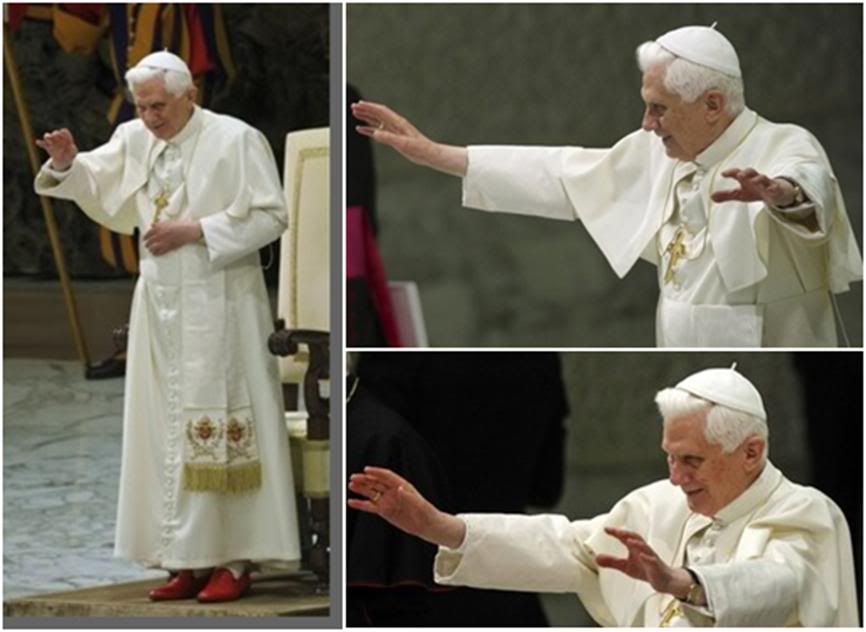
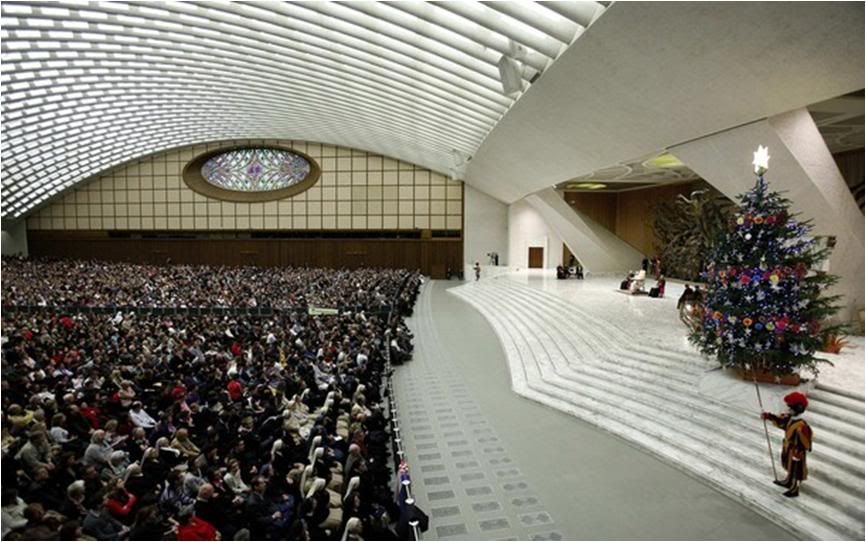
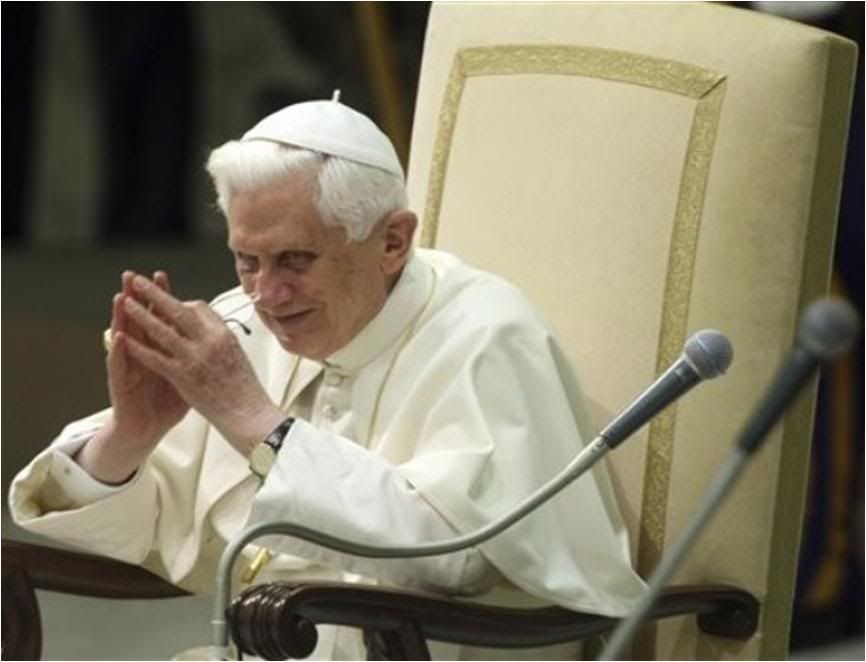
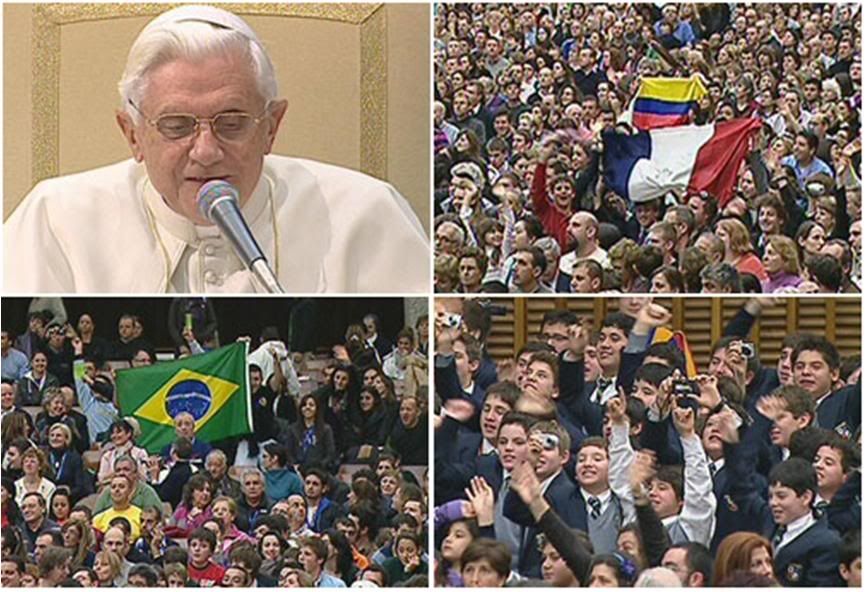 Here is a translation of the full catechesis:
Here is a translation of the full catechesis:
Dear brothers and sisters,
On this last audience of the year, I wish to speak to you about Pierre Lombard (Pietro Lombardo), a theologian who lived in the 12th century and enjoyed great fame because one of his works, entitled Sentences, was adopted as a manual for theology over many centuries.
Who was Pierre Lombard? Although information about his life is scarce, we can reconstruct the essentials of his biography. He was born between the 11th and 12th centuries, near Novara, in northern Italy, within a territory that had belonged to the Longobards for some time - and that is why he was given the appelative 'Lombard'.
He belonged to a family of modest means, as we can deduce from the letter of introduction written for him by Bernard of Cairvaux to Gilduin, superior of the Abbey of St. Victor in Paris, asking him to take in Pietro for free, as the young man wished to go to Paris for further study.
In fact, even in the Middle Ages, it was not just the nobility or the wealthy who could study and acquire important roles in social and ecclesial life, but even persons with humble origins, such as Gregory VII, the Pope who held his ground against [Emperor] Henry IV, and Maurice of Sully, the Archbishop of Paris who ordered the construction of Notre-Dame cathedral and was the son of a poor peasant.
Pierre Lombard began his studies in Bologna, and went on to Rheims, and then Paris. From 1140 onwards, he taught at the prestigious school of Notre Dame. Esteemed and much appreciated as a theologian, he was entrusted eight years later by Pope Eugene III with examining the teachings of Gilbert Porretano which had stirred up much discussion because they were considered unorthodox. Pierre was named Bishop of Paris in 1159, just a year before he died in 1160.
Like all the teachers of theology in his time, Pierre wrote discourses and commentary texts on Sacred Scripture. But his masterpiece consists of the four books of Sentences, a text that was conceived for the purpose of teaching.
According to the theological method used at the time, students had to know, study and comment on the thinking of the Fathers of the Church and other writers considered authoritative. Thus, Pierre assembled a vast documentation, consisting principally of the teachings of the great Latin Fathers, especially St. Augustine, but also open to the contribution of his contemporary theologians.
He also utilized an encyclopedic work of Greek theology, which had only been recently known to the West: The Orthodox faith, by St. John Damascene.
Pierre Lombard's great merit was to have organized all the material that he had gathered and chosen with care into a systematic and harmonious oicture. Indeed, one of the characteristics of theology is to organize the patrimony of the faith in a unified and organized way.
Thus, he distributed the 'sentences' - the patristic sources - into various topics contained in four volumes. The first volume was on God and the Trinitarian mystery; the second, on Creation, sin and Grace; the third, on the mystery of the Incarnation and the work of Redemption, with an ample exposition on the virtues. And the last volume was dedicated to the sacraments and the final realities of eternal life [what Italians call the Novissimi].
The overall vision that emerges includes almost all the truths of the Catholic faith. This synthetic view and its clear, organized, schematic and always consistent presentation explain the extraordinary success of Pierre Lombard's Sentences.
They allowed certainty of learning on the part of students, and an ample space for deeper analysis by the teachers who used the books. A Franciscan theologian, Alexander Hales [an Englishman], who lived one generation after Pierre, introduced a subdivision to the Sentences, which made it easier to consult.
Even the greatest theologians of the 13th century - Albertus Magnus, Bonaventure of Bagnoregio and Thomas Aquinas - began their academic activity by commenting on the four books of Pierre Lombard's Sentences, enriching them with their reflections. Lombard's text was used in all theology schools until the 16th centruy.
I wish to underscore how the organic presentation of the faith is an indispensable requirement. In fact, the single truths of the faith illumine each other, and a total unified view of these truths shows the harmony of God's plan of salvation and the centrality of the mystery of Christ.
Following Pierre Lombard's example, I call on all theologians and priests always to have in mind a full view of Christian doctrine against the dangers of fragmentation and the devaluation of individual truths.
The Catechism of the Catholic Church, as well as its Compendium, offer us this complete picture of the Christian Revelation that we should accept with faith and gratitude.
Thus, I wish to encourage individuals and Christian communities to avail of these instruments in order to know and to look deeper into the contents of our faith. It will appear as a marvelous symphony that speaks to us of God and his love and which will elicit our firm adherence and our industrious response.
To have an idea of the interest that a reading of Pierre Lombard's Sentences can still bring up today, I will give two examples.
Inspired by St. Augustine's commentary on the Book of Genesis, Pierre asks why woman was created from a rib of Adam, not from his head or from his legs. He explains: "What came forth was not a dominator nor a slave to man, but rather, a companion" (Senteza 3, 18,3).
Then, still on the basis of Patristic teeching, he adds: "This act represents the mystery of Christ and thehurch. Indeed, just as woman was formed from Adam's rib as he slept, so the Church was born from the sacraments that began to flow from the rib of Christ as he 'slept' on the Cross, from blood and water, with which we are redeemed from punishment and purified of sin" (Sentenza, 3, 18,4).
These are profound reflections that are still valid today when the theology and spirituality of Christian matrimony have greatly deepened the analogy to the spousal relationship between Christ and his Church.
In another passage from his principal work, Pierre Lombard, writing about the merits of Christ, asks: "For what reason, then, did Christ wish to suffer and die, if his virtues were sufficient to gain him every merit?" His response is incisive and effective: "(He died) for you, not for himself!"
Then he continues with another question and answer, which seem to reproduce the discussions held during the lessons of medieval theologians: "What does it mean that Christ suffered and died for me? So that his passion and death can be an example and a cause for you. An example of virtue and humility, a cause for glory and freedom - an example given by God who is obedient unto death, and the cause of your liberation and your beatitude" (Sentenze 3, 18,5).
Among the most important contributions by Pierre Lombard to the history of theology, I wish to point out his treatise on the sacraments, of which he gave a definition that I would call final: "A sacrament is that which is a sign of God's grace, the visible form of invisible grace, in such a way that it carries its image and causes it as well" (4, 1,4).
With this definition, Pieree Lombard grasped the essense of sacraments: they are tha cause of grace - they have the true capacity to communicate divine life.
Successive theologians never abandoned this view and also used the distinction between material and formal elements introduced by the Master of Sentences, as Pierre Lombard came to be called.
The material element is the sensible and visible reality [of the sacrament]; the formal element consists of the words spoken by the minister. Together, they are essential for a complete and valid celebration of the sacraments: matter, the reality through which the Lord touches us visibly, and the word which gives the sacrament its spiritual significance.
In Baptism, for example, the material element is the water which is poured over the baby's head, and the formal element, the words "I baptize you in the name of the Father, the Son and the Holy Spirit".
Lombard also clarified that only the sacraments objectively transmit divine grace, and that there are seven: Baptism, Confirmation, the Eucharist, Penance, Unction of the Sick, Holy Orders, and Matrimony (cfr Sentenze 4, 2,1).
Dear brothers and sisters, it is important to recognize how precious and indispensable sacramental life is to every Christian, through which the Lord touches and transforms us in the community of the Church.
As the Catechism of the Catholic Church says, the sacraments are "powers that come forth from the Body of Christ, which is ever living and life-giving... actions of the Holy Spirit" (No. 1116).
In this Year for Priests that we are celebrating, I call on priests, especially those ministers who are responsible for souls assigned to them, to have themselves, in the first place, an intense sacramental life, in order to be of help to the faithful.
The celebration of the sacraments should be marked with dignity and decorum, promote personal meditation and communnity participation, a sense of the presence of God, and missionary zeal. The sacraments are the great treasure of the Church, and each of us has the task of celebrating them for their spiritual fruits.
In the sacraments, an always surprising event touches our live: Christ, through visible forms, comes to us, purifies us, transforms us and makes us take part in his divine friendship.
Dear friends, we have come to the end of this year and before the gates of the New Year. My wish is that the friendship of our Lord Jesus Christ accompanies you every day of the year that is to come. May this friendship with Christ be our light and guide, helping us to be men of peace, of his peace.
Happy New Year to all of you!
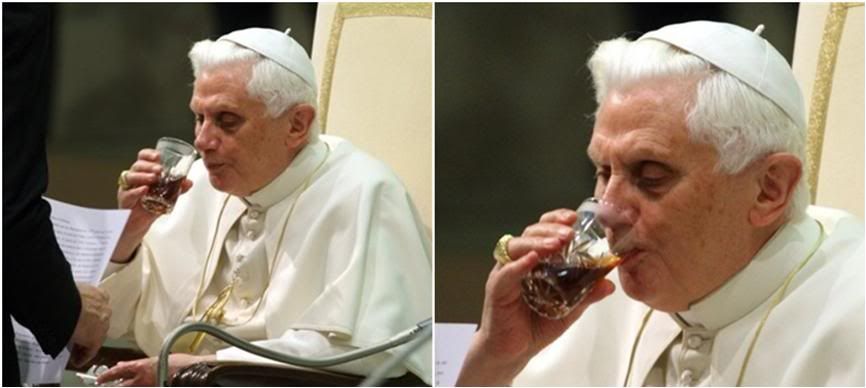
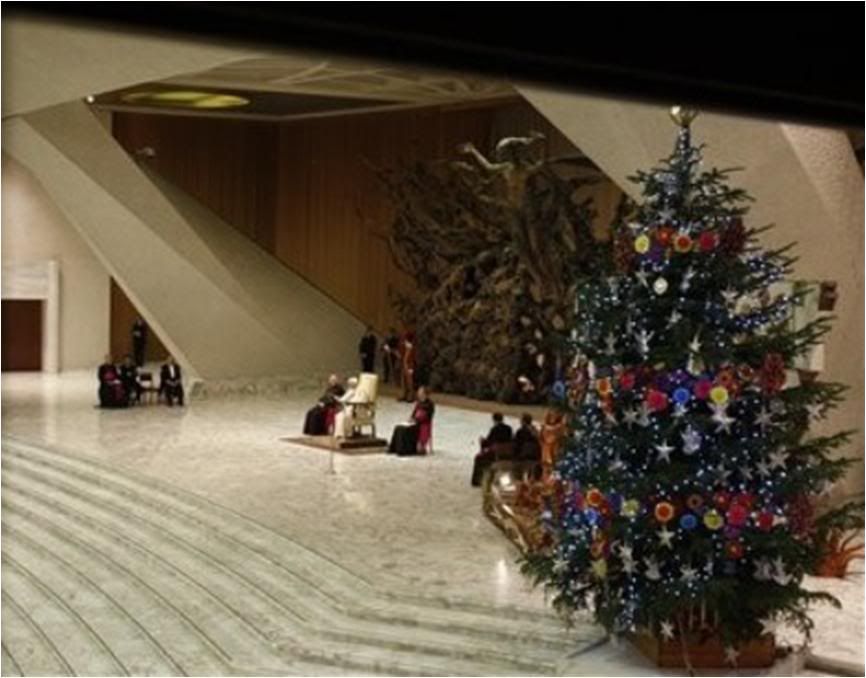
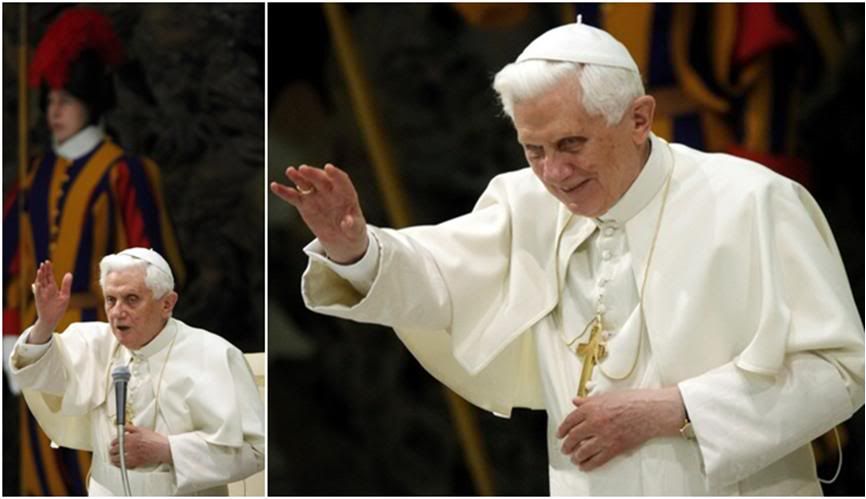
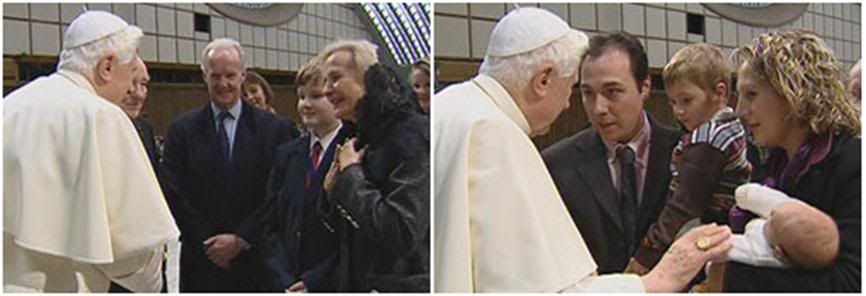 The Holy Father's comments about theologians reminded me of the recent death (on Christmas Eve) of one of Joseph Ratzinger's fellow experts at Vatican-II, the Dutch Dominican Edward Schillebeeckx, 90 - who ended up being warned repeatedly by Cardinal Ratzinger's CDF in the 1970s-1980s for his unorthodox teachings and writings, most notably that he claimed the Resurrection was not objective fact; besides that, he advocated married priests, independent bishops and the like.
The Holy Father's comments about theologians reminded me of the recent death (on Christmas Eve) of one of Joseph Ratzinger's fellow experts at Vatican-II, the Dutch Dominican Edward Schillebeeckx, 90 - who ended up being warned repeatedly by Cardinal Ratzinger's CDF in the 1970s-1980s for his unorthodox teachings and writings, most notably that he claimed the Resurrection was not objective fact; besides that, he advocated married priests, independent bishops and the like.
Paolo Rodari wrote a nice little article that pointed out how Schillebeeckx (more than Hans Kueng) was the principal advocate of Vatican-II as rupture with the past. I have been meaning to translate it, since the English articles I have seen so far are too 'respectful' to say that outright.
[Modificato da TERESA BENEDETTA 30/12/2009 20:24] |